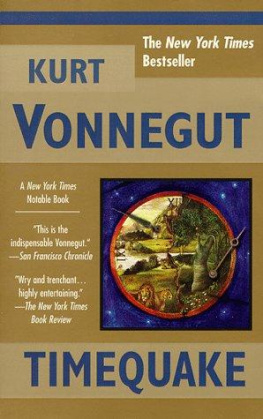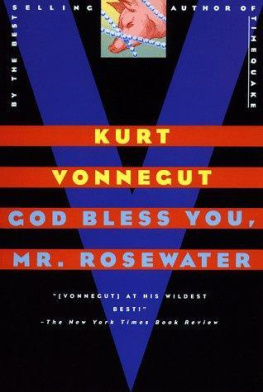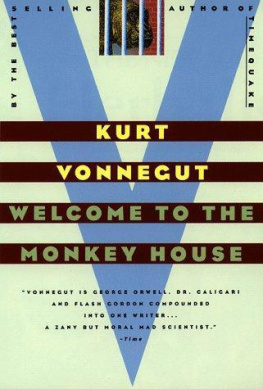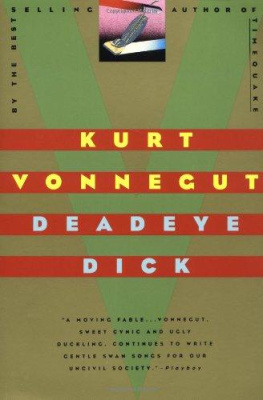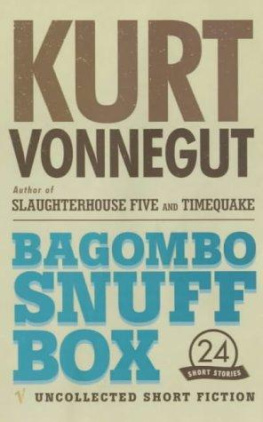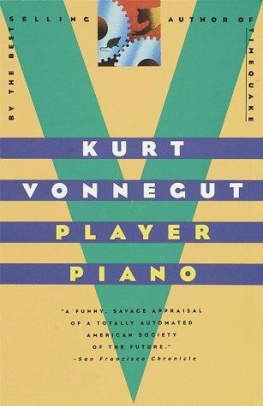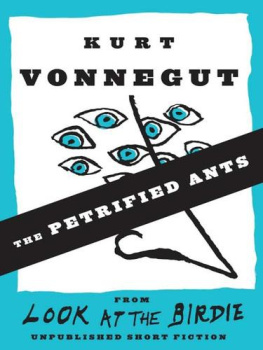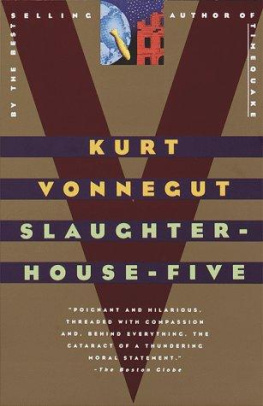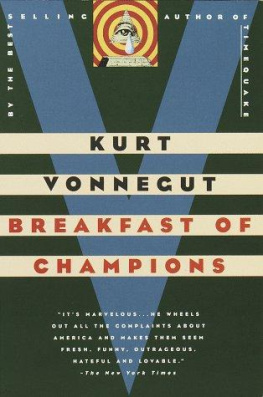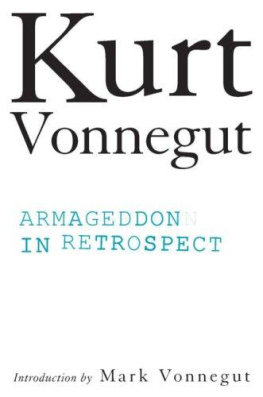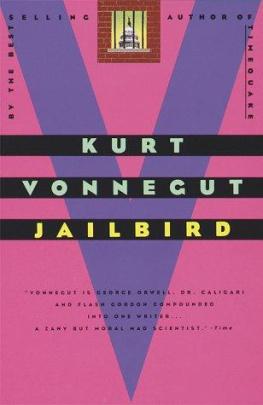Kurt Vonnegut - Timequake
Here you can read online Kurt Vonnegut - Timequake full text of the book (entire story) in english for free. Download pdf and epub, get meaning, cover and reviews about this ebook. year: 1998, publisher: Berkley Trade, genre: Detective and thriller. Description of the work, (preface) as well as reviews are available. Best literature library LitArk.com created for fans of good reading and offers a wide selection of genres:
Romance novel
Science fiction
Adventure
Detective
Science
History
Home and family
Prose
Art
Politics
Computer
Non-fiction
Religion
Business
Children
Humor
Choose a favorite category and find really read worthwhile books. Enjoy immersion in the world of imagination, feel the emotions of the characters or learn something new for yourself, make an fascinating discovery.
- Book:Timequake
- Author:
- Publisher:Berkley Trade
- Genre:
- Year:1998
- Rating:3 / 5
- Favourites:Add to favourites
- Your mark:
- 60
- 1
- 2
- 3
- 4
- 5
Timequake: summary, description and annotation
We offer to read an annotation, description, summary or preface (depends on what the author of the book "Timequake" wrote himself). If you haven't found the necessary information about the book — write in the comments, we will try to find it.
Timequake — read online for free the complete book (whole text) full work
Below is the text of the book, divided by pages. System saving the place of the last page read, allows you to conveniently read the book "Timequake" online for free, without having to search again every time where you left off. Put a bookmark, and you can go to the page where you finished reading at any time.
Font size:
Interval:
Bookmark:
Ernest Hemingway in 1952 published in Life magazine a long short story called The Old Manand the Sea. It was about a Cuban fisherman who hadn't caught anything for eighty-four days. The Cuban hooked an enormous marlin. He killed it and lashed it alongside his little boat. Before he could get it to shore, though, sharks bit off all the meat on the skeleton. I was living in Barnstable Village on Cape Cod when the story appeared. I asked a neighboring commercial fisherman what he thought of it. He said the hero was an idiot. He should have hacked off the best chunks of meat and put them in the bottom of the boat, and left the rest of the carcass for the sharks.
It could be that the sharks Hemingway had in mind were critics who hadn't much liked his first novel in ten years, Across the River and into the Trees, published two years earlier. As far as I know, he never said so. But the marlin could have been that novel. And then I found myself in the winter of 1996 the creator of a novel which did not work, which had no point, which had never wanted to be written in the first place. Merde! I had spent nearly a decade on that ungrateful fish, if you will. It wasn't even fit for shark chum. I had recently turned seventy-three. My mother made it to fifty-two, my father to seventy-two. Hemingway almost made it to sixty-two. I had lived too long! What was I to do? Answer: Fillet the fish. Throw the rest away.
This I did in the summer and autumn of 1996. Yesterday, November 11th of that year, I turned seventy-four. Seventy-four!
Johannes Brahms quit composing symphonies when he was fifty-five. Enough! My architect father was sick and tired of architecture when he was fifty-five. Enough! American male novelists have done their best work by then. Enough! Fifty-five is along time ago for me now. Have pity!
My great big fish, which stunk so, was entitled Timequake. Let us think of it as TimequakeOne. And let us think of this one, a stew made from its best parts mixed with thoughts and experiences during the past seven months or so, as Timequake Two. Hokay?
The premise of Timequake One was that a timequake, a sudden glitch in the space-time continuum, made everybody and everything do exactly what they'd done during a past decade, for good or ill, a second time. It was dj vu that wouldn't quit for ten long years. You couldn't complain about life's being nothing but old stuff, or ask if just you were going nuts or if everybody was going nuts.
There was absolutely nothing you could say during the rerun, if you hadn't said it the first time through the decade. You couldn't even save your own life or that of a loved one, if you had failed to do that the first time through.
I had the timequake zap everybody and everything in an instant from February 13th, 2001, back to February 17th, 1991. Then we all had to get back to 2001 the hard way, minute by minute, hour by hour, year by year, betting on the wrong horse again, marrying the wrong person again, getting the clap again. You name it!
Only when people got back to when the timequake hit did they stop being robots of their pasts. As the old science fiction writer Kilgore Trout said, "Only when free will kicked in again could they stop running obstacle courses of their own construction.''
Trout doesn't really exist. He has been my alter ego in several of my other novels. But most of what I have chosen to preserve from Timequake One has to do with his adventures and opinions. I have salvaged a few of the thousands of stories he wrote between 1931, when he was fourteen, and 2001, when he died at the age of eighty-four. A hobo for much of his life, he died in luxury in the Ernest Hemingway Suite of the writers' retreat Xanadu in the summer resort village of Point Zion, Rhode Island. That's nice to know.
His very first story, he told me as he was dying, was set in Camelot, the court of King Arthur in Britain: Merlin the Court Magician casts a spell that allows him to equip the Knights of the Round Table with Thompson submachine guns and drums of .45-caliber dumdums. Sir Galahad, the purest in heart and mind, familiarizes himself with this new virtue-compelling appliance. While doing so, he puts a slug through the Holy Grail and makes a Swiss cheese of Queen Guinevere.
Here is what Trout said when he realized that the ten-year rerun was over, that he and everybody else were suddenly obligated to think of new stuff to do, to be creative again: "Oh, Lordy! I am much too old and experienced to start playing Russian roulette with free will again." Yes, and I myself was a character in Timequake One, making a cameo appearance at a clambake on the beach at the writers' retreat Xanadu in the summer of 2001, six months after the end of the rerun, six months after free will kicked in again.
I was there with several fictitious persons from, the book, including Kilgore Trout. I was privileged to hear the old, long-out-of-print science fiction writer describe for us, and then demonstrate, the special place of Earthlings in the cosmic scheme of things. So now my last book is done, with the exception of this preface. Today is November 12th, 1996, about nine months, I would guess, from its publication date, from its emergence from the birth canal of a printing press. There is no rush. The gestation period for a baby Indian elephant is more than twice that long.
The gestation period for a baby opossum, friends and neighbors, is twelve days. I have pretended in this book that I will still be alive for the clambake in 2001. In chapter 46,1 imagine myself as still alive in 2010. Sometimes I say I'm in 1996, where I really am, and sometimes I say I am in the midst of a rerun following a timequake, without making clear distinctions between the two situations. I must be nuts.
Call me Junior. My six grown kids do. Three are adopted nephews, three are my own. They call me Junior behind my back. They think I don't know that.
I say in speeches that a plausible mission of artists is to make people appreciate being alive at least a little bit. I am then asked if I know of any artists who pulled that off. I reply, "The Beatles did."
It appears to me that the most highly evolved Earthling creatures find being alive embarrassing or much worse. Never mind cases of extreme discomfort, such as idealists' being crucified. Two important women in my life, my mother and my only sister, Alice, or Allie, in Heaven now, hated life and said so. Allie would cry out, "I give up! I give up!" The funniest American of his time, Mark Twain, found life for himself and everybody else so stressful when he was in his seventies, like me, that he wrote as follows: "I have never wanted any released friend of mine restored to life since I reached manhood.'" That is in an essay on the sudden death of his daughter Jean a few days earlier. Among those he wouldn't have resurrected were Jean, and another daughter, Susy, and his beloved wife, and his best friend, Henry Rogers. Twain didn't live to see World War One, but still he felt that way. Jesus said how awful life was, in the Sermon on the Mount: "Blessed are they that mourn,'' and
"Blessed are the meek," and "Blessed are they which do hunger and thirst after righteousness." Henry David Thoreau said most famously, "The mass of men lead lives of quiet desperation." So it is not one whit mysterious that we poison the water and air and topsoil, and construct ever more cunning doomsday devices, both industrial and military. Let us be perfectly frank for a change. For practically everybody, the end of the world can't come soon enough. My father, Kurt Senior, an Indianapolis architect who had cancer, and whose wife had committed suicide some fifteen years earlier, was arrested for running a red light in his hometown. It turned out that he hadn't had a driver's license for twenty years!
Font size:
Interval:
Bookmark:
Similar books «Timequake»
Look at similar books to Timequake. We have selected literature similar in name and meaning in the hope of providing readers with more options to find new, interesting, not yet read works.
Discussion, reviews of the book Timequake and just readers' own opinions. Leave your comments, write what you think about the work, its meaning or the main characters. Specify what exactly you liked and what you didn't like, and why you think so.

